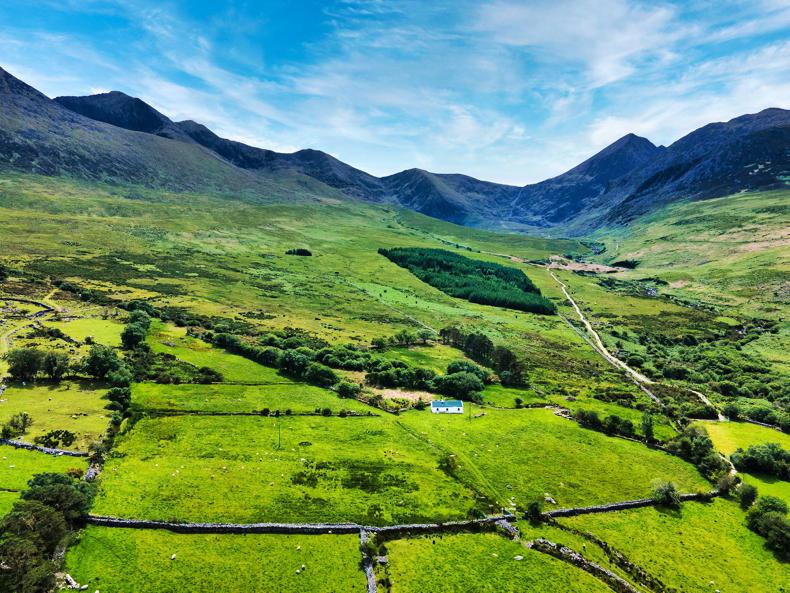The 25% target for cutting farm emissions cannot be reached, it appears, without actual reductions in herd numbers. Ireland’s grass-based dairy sector has been assessed by the European Commission’s Joint Research Centre as carbon-efficient, in the sense that emissions per unit for dairy products are lower than in alternative locations.
This supports the view of agricultural experts that there is limited scope for cutting emissions through improvements to farm management and to input use.
The scale of herd reductions implied by the 25% compromise is not known but Phelim O’Neill, in an Irish Farmers Journal posting last week, suggested that the beef herd might need to fall 13% and the dairy herd around 11%.
The story of Irish agriculture in recent years has been largely about dairy expansion on the back of quota abolition in 2015.
A popular narrative these last few weeks has been the absence of empathy for the farm sector in leafy Dublin 4, presumed to be the engine-room of Irish political opinion. This Dublin suburb also houses a large portion of the country’s economists and they are not at all enthusiastic about the chosen policy.
Thirty years ago, when the reports of the Intergovernmental Panel on Climate Change (IPCC) first began to sound the alarm, a consensus emerged very quickly about the economics of the climate crisis and how best to deal with it.
Fossil fuels
Accepting the scientific evidence that the combustion of fossil fuels should be discouraged, and alternatives to high carbon technologies incentivised, economists recommended reliance on market signals, especially a universal tax on products and services which embody emissions, a carbon tax. Had this been introduced promptly, even at a low level but subject to steady year-by-year increases, it would have prevented the relentless rise in emissions of recent decades which have turned a problem into a crisis.
It would have worked directly through restraining consumption of high-carbon products but also through encouraging technologies alternative to fossil fuel combustion without the plethora of subsidies and handouts which has emerged in its stead.
A serious long-term commitment to making emissions expensive at the consumer end was the economists’ central proposal and Yale University’s Bill Nordhaus won the 2018 Nobel prize for economics for his career-long research on carbon pricing.
World demand equals world supply, fix demand and you have fixed emissions
Since free international trade and specialisation are demonstrably preferable to protectionism and go-it-alone national policies, the Nordhaus approach would have ignored notions of national responsibility for emissions as measured on the production side.
World demand equals world supply, fix demand and you have fixed emissions.
Let production find its own best location, the one that minimises overall costs.
Several European countries, including Ireland, have carbon taxes on a smaller scale than Nordhaus recommended and there is a messier EU carbon-pricing scheme built around traded emission permits for large industries.
Too many countries have no serious carbon pricing at all and there are actual state subsidies on the consumption of oil products in several.
Worldwide
Europe has pursued carbon reduction more vigorously than other major regions of the world economy but is responsible for only around 10% to 12% of worldwide emissions.
Unfortunately the toolbox includes territorial, country-by-country emissions targets, broken down by national governments into sectoral targets unaccompanied by explicit policies designed to deliver them. This makes no economic sense and has nowhere received endorsement from researchers on the economics of climate policy.
Their view has been that emissions should be reduced – there is a massive market failure when negative externalities go unpunished – but it is essential to minimise the costs of attaining the needed reductions. They should happen geographically wherever the cost is lowest, since worldwide demand will always attract supply from somewhere.
Ireland is a substantial exporter of livestock products, especially dairy, for good reasons. The portion of emissions, when measured on a production basis, arising in Irish farming is around 37%, four times the emissions share of farming in most European countries. Irish people do not consume four times the food intake of their European neighbours. Nor are Irish farmers incompetent, they merely enjoy advantages of soil and climate, as do farmers in Normandy, England’s southwest and Denmark, which favour grass-based dairying.
Global emissions, all that matters scientifically, could be increased by imposing ill-designed territorial production targets.









SHARING OPTIONS